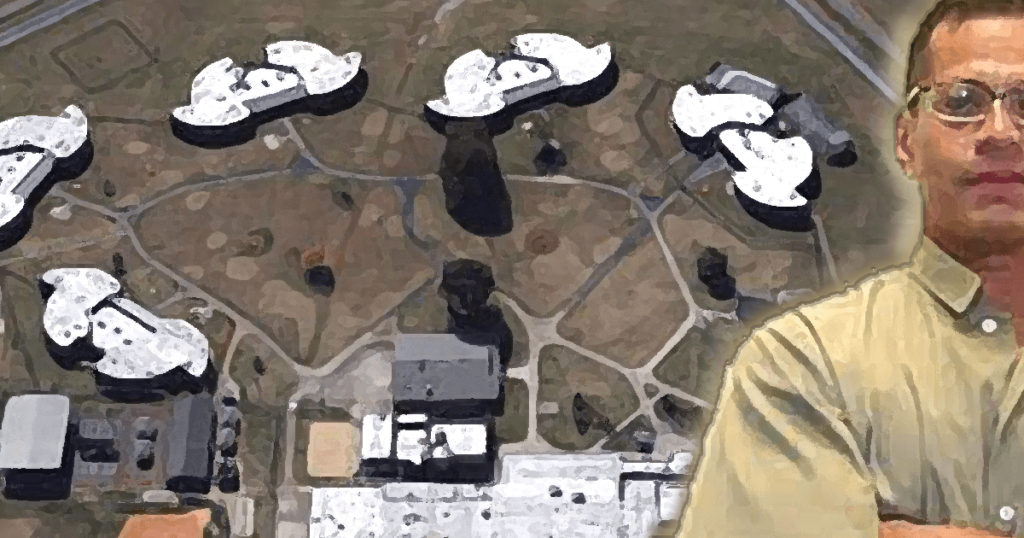One More Casualty From “The War on Drugs”
By Edwin Rubis
Currently serving a 40-year federal sentence for a nonviolent marijuana conspiracy offense
There I stood in front of my wife.
The wooden balustrade between us portrayed a high, high impassable barrier.
My attorney had inquired, at my behest, before a 15-minute court recess, for permission to hold my newborn son, named Austin. Judge David Hittner overruled such request, killing my earnest hope.
Teary-eyed, I stared upon Austin peacefully sleeping in my wife’s arms. Before I could say anything, one of the two impatient-looking U.S. Marshalls standing beside me said, “Okay, that’s enough.”
More than ten spectators, including part of my family, a bailiff, three Marshalls, two prosecutors, and a Houston Chronicle news reporter sitting at the far end of the courtroom, all watched in silence as I stood facing them from the defense table.
My mother rested her hand on Sara’s shoulder, indicating it was time for her to sit back down.
A minute to appreciate him from afar was better than nothing.
By now I had been in jail for seven months, and it would not be until a year later that I’d finally get to hold him in my arms, during a prison visit.
The trial resumed with its excruciating demeanor. For the past four days, cooperating informants after cooperating informants had taken the stand at the direction of the prosecutor, Ms. Martha Minnis, brushing and painting, brushing and painting a condemning picture of me, the defendant. But before the testimonial charade came to its summation, an unexpected interruption took place.
“Where’s the justice in all of this? This isn’t fair!” I said as I stood up, toppling the chair I was sitting on backward, in a voice louder than I had intended.
“He needs to sit back down and be quiet!” Judge Hittner said, pointing to my court-appointed attorney, who was caught off guard along with the Marshalls who now had taken a step toward the defense table.
“That’s the way federal law works,” my attorney had said, “The government can prove its case against you through hearsay testimony.”
At this late stage of the game, my attorney’s premise had proven correct, and the prosecution had the winning hand.
 I was handcuffed without a struggle, led out of the courtroom, and placed in a holding jail cell to await the verdict. Before long, after the government rested their case and the judge charged the jury to deliberate, I was found guilty.
I was handcuffed without a struggle, led out of the courtroom, and placed in a holding jail cell to await the verdict. Before long, after the government rested their case and the judge charged the jury to deliberate, I was found guilty.
Less than a year later, I again stood there, shackled and fettered, in the same courtroom, facing the head-high, walnut bench upon which Judge Hittner presided.
After short formalities and legal objections, judgment was pronounced: “I hereby sentence you to 40 years to be served in a United States Penitentiary… and I’m making a strong recommendation that Mr. Rubis remains incarcerated at a maximum-security prison. If any changes are to be made in the future, I want to be notified.”
The year was 1999.
Since then, I’ve gone through a metamorphosis of sorts. Some painful. Some partially joyful.
Then, for some precarious reason, I was diagnosed with a life-threatening illness. This time I almost died, without my assistance, of course. But by God’s grace, I survived to see another day in the belly of the beast.
My wife eventually left me, as anyone in her shoes would, and remarried. She took my sons away. I would not see them nor hear from them for what seemed like an eternity. Now they are in their late twenties and barely know their father.
The War on Drugs Still Holds Hostages
The last 23 1/2 years of my incarceration have been torturous. Especially during the Christmas Holidays. I doubt my family will come and visit this time around. The grueling eleven-hour drive from Houston to Alabama is too much for my 78-year-old mother, and my 80-year-old father, to just come and sit for two hours behind a Plexiglas partition to see their son.
Overall, I consider myself more of a casualty than a victim of “the war on drugs”, if you were to ask me. For, no matter what, I’m still confined in a twelve-by-twelve dungeon-looking prison cell, adorned with a metal bunk and a paper-thin mattress. I’m still living with the illusion of reprieve that perhaps one day, someone, someday, somehow, will read my story and do something about it.
Thanksgiving is only a few days away. President Biden will be pardoning turkeys. Will he take the time to think about us? Those who also deserve an extension of mercy? I seriously doubt it.
Maybe I’m just dreaming of my freedom as I’ve done on countless, sleepless nights. Or just maybe one day someone will shake me awake from this non-ending nightmare I keep on living on and on and on … until God knows when.
– Edwin Rubis, a frontline correspondent in the ongoing War on Drugs
Edwin Rubis is serving a 40-year sentence for a non-violent marijuana offense. You can help advocate for his release by sharing this story on social media, by writing your legislators, tweeting President Biden, and using the hashtag #freeedwinrubis
Read more from Edwin Rubis HERE, HERE, and HERE
If you’d like to write to Edwin:
Edwin Rubis # 79282-079
FCI-Talladega
PMB 1000
Talladega, AL 35160
#freeedwinrubis
















